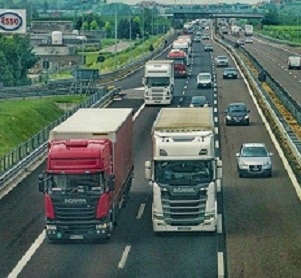 Swiftly and with little warning, the global pandemic caused by Covid-19 has forever altered the global economy. The shutdown of businesses, shops and travel has meant seismic change in our daily lives, trade, and work, writes Mark Marshall, Sales Director, Flegg Projects.
Swiftly and with little warning, the global pandemic caused by Covid-19 has forever altered the global economy. The shutdown of businesses, shops and travel has meant seismic change in our daily lives, trade, and work, writes Mark Marshall, Sales Director, Flegg Projects.
Whilst the shutdown is a temporary safety measure, the effects of the changes will more than likely be permanent. From small scale home delivery to industrial-level machinery movers, the rapid response of companies to adjust and accommodate the new reality has been inspiring.
So, what exactly are those permanent changes and what will it mean for the haulage and logistics industry?
Driver and transportation careers
The average age of an HGV driver is 57, while 13 per cent are over 60. Professional drivers are widely recognised as an older demographic, who due to their profession and age, are also potentially less healthy overall.
The industry as a whole has been aware of the need to implement changes to support the current workforce to improve the quality of their work life, but also to refresh public opinion of professional driving as a career choice and the benefits of the industry as a whole.
The heavy reliance on e-commerce since lockdown began has meant immediately increasing the number of people in driving roles across the board
The pandemic has highlighted the ephemeral and temporary nature of so many things we have all taken for granted. What has not changed is the need for reliable and efficient road transport.
The heavy reliance on e-commerce since lockdown began has meant immediately increasing the number of people in driving roles across the board. This need for recruitment is being fed by younger workers, those in the retail, hospitality, and leisure sectors, and those who don’t have university degrees.
This dovetails very well with the current need within the haulage industry, proving to previously reluctant candidates that the driving careers opportunities available are more stable than previously thought.
With companies implementing social distancing, PPE wear for drivers and delivery persons, provision of hand sanitisers and requesting that bathroom and handwashing facilities be made available, they have done what they can in many cases to ensure the safety and health of their staff. This quick adjustment to comply with WHO and government guidelines has proven the need for plans and provisions to be in place for worst case scenario eventualities and an agile company outlook to implement them.
Retention of higher inventories
We have seen many companies suffer due to cost saving exercises, such as keeping purposefully low stock levels to reduce the need for warehousing, potential overstock and loss of profit, instead opting to order or manufacture as demand dictated.
Since the pandemic hit, companies that had employed this strategy, found that with stressed supply chains and low inventory levels were unable to respond as quickly to the customer demands and adapt.
With the pandemic closing borders, halting air and sea travel along with freedom of movement over land, impacted the leisure air travel industry almost instantly
Consequently, in future these companies and others who have seen this ensuing chaos, may decide to increase and maintain higher inventory levels as a safety measure. This will be especially important for essential goods such as pharmaceuticals.
Financial analysts, forecasters and lenders will favour companies with agile contingency plans and well-fed supply chains. Because of this, companies will become more highly valued for their sustainability and resilience in the face of any future crisis. This more cautious outlook could mean that less money will be available for investment and innovation.
The importance of air cargo and freighter
With the pandemic closing borders, halting air and sea travel along with freedom of movement over land, impacted the leisure air travel industry almost instantly.
Several cruise liners having become hot-spots for CovId-19 outbreaks has shaken consumer confidence in leisure sea travel.
The lockdown has also proved that commuting or traveling for work is not as necessary as once believed, leading to workers becoming comfortably accustomed to remote working and therefore cutting the need for face-to-face meetings.
What has not changed is the need for air and sea freight services. The knock-on effect of increased inventory, fewer overall businesses due to increased market share and raised goods prices will mean higher inflation and a higher cost of capital.
If those knock-on effects happen and interest rates increase, so will the cost of carrying high value goods for a longer period. This will favour air cargo because of the financial cost of inventory.
The necessity of freighters and air cargo has never been more apparent and will remain so for the foreseeable future.


